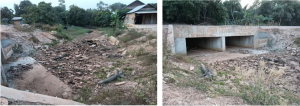
The Greater Mekong Subregion (GMS) includes the sovereign nations of Cambodia, Lao People’s Democratic Republic (Lao PDR), Thailand, and Viet Nam. With a rapidly increasing population in the range of 250 million people, the region is experiencing more variable surface water flows, a prolonged dry season and intensifying droughts and a growing demand for water resources including groundwater. Despite relatively abundant surface water resources, a considerable number of low-income groups and urban/rural communities rely on low-cost groundwater for their domestic, agrarian and industrial use. Several groundwater reserves are transboundary, and it is recognised that there is limited capacity to manage these shared resources and limited knowledge about the sustainable yields of these transboundary aquifers. Due to rapid economic and population growth, pressures on groundwater in the region are increasing fast.
In the recent past over-extraction of groundwater for production of high-value crops, such as coffee, has caused a severe drop in groundwater levels in parts of the Vietnamese highlands. The same is happening in the upstream part of the Mekong Delta (Cambodia) were rice production for export causes unsustainable use of groundwater. Intensification of irrigation to meet the food demand of growing populations rapidly increases use of groundwater in all countries in the region. In some areas such as southern Cambodia, parts of Lao PDR and the Mekong and Ayeyarwady Deltas, naturally occurring arsenic contamination is already exacerbated by increased groundwater use and higher pumping rates. Throughout the GMS, complex relationships occur between upstream recharge areas and downstream aquifers.
This proposal seeks to address this institutional and governance challenge through implementing a transboundary groundwater collaboration. The objective is to establish effective regional capacities, partnerships and network in the Greater Mekong Subregion for the sustainable management and utilization of groundwater resources as an adaptation response to protect people, livelihoods, and ecosystems from climate change impacts.
The project aims to benefit around 1.5 million people indirectly, it also targets to create a groundwater community of practice (CoP) of around 20 experts, equipped with the skills to ensure technical and management capabilities. Additionally, it will support the regulatory framework to manage resources and expand new groundwater-based resilience strategies and practical interventions by proposing either primary or secondary legislations in the targeted countries.
| Project Component 1: Groundwater resource assessment and monitoring | US$ 1,180,000 |
| Project Component 2: : Priority use and stakeholders | US$ 495,000 |
| Project Component 3: Resource management, information, tools, and equipment | US$ 980,000 |
| Project Component 4: : Regional cooperation, coordination and information exchange | US$ 505,000 |
| Project Component 5: Capacity building and training | US$ 1,001,379 |
| Project execution cost | US$ 374,524 |
| Total project cost | US$ 4,535,903 |
| UNESCO Project Cycle Management Fee | US$ 362,872 |
| Grant Amount | US$ 4,898,775 |
Project Documents
| Attachment | Type | Size |
|---|---|---|
| Project concept | 4 MB | |
| Project document | 5 MB |


